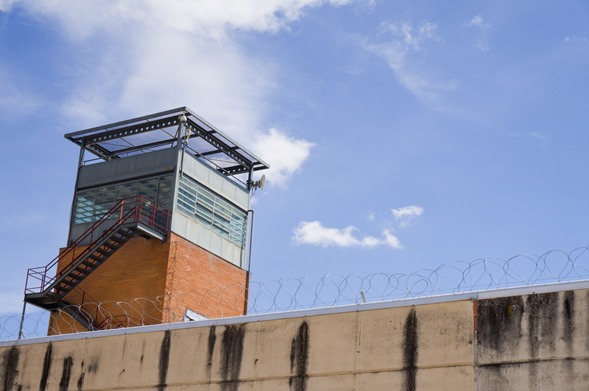The views expressed in our content reflect individual perspectives and do not represent the authoritative views of the Baha'i Faith.
As the bailiff led the girl away who (may or may not have) burglarized my house, I turned to console her father.
“I am so sorry,” he said to me through his tears. “Me, too,” was all I could think to say.
When he walked out of the courtroom, utter defeat in the set of his shoulders, the police detective who had investigated the case came over to say hello.
“Well, that turned out successfully,” he said, smiling.
“For who?” I asked. His smile disappeared.
“You’re not happy? Hey, they’re just druggies, beach trash. Justice was done,” he told me, defensive.
“You think?” I said. “So, speaking of justice, what happened to the other one, the kid I caught? He probably had a lot more to do with it than she did.”
“Oh, him,” the detective said, “We cut him a deal. Released him after he gave us the name of one of the other burglars. But we haven’t found that guy yet.”
“You released him?” I asked, incredulous. “He probably put the whole thing together, and she just went along. I don’t think she even knew it was a burglary.” The cop shrugged and turned away, just another day at work for him.
I left the courtroom depressed, disgusted and perplexed. What could I possibly do, I asked myself, to have any impact at all on this broken justice system, which delivered so much injustice? I kept seeing the bruised face of that young girl in my mind, and wondering what would happen to her.
That’s when I started talking to people about our system of crime and punishment. I had previously worked for several years in the substance abuse treatment field, so I started asking friends from that world about drug rehab for criminals.
I got what I call the Mahatma answer: when someone asked Gandhi what he thought about Western civilization, he said “I think it would be a good idea.”
My friends told me that only a handful of states and countries had adopted effective criminal justice policies for treating chemical dependency. I learned that most states, including my own, had no real drug diversion or treatment programs, or only had a few treatment slots for an overwhelming number of potential patients. That explained the long waiting list.
Then I talked to Sherman Block, who at the time was the Sheriff of Los Angeles County. My questions seemed to strike a nerve with him. He told me that one year he ordered blood and alcohol breathalyzer tests on every prisoner they booked. What he found shocked him, and me. They discovered that more than three-quarters of people booked into the LA County Jail for crimes were either drunk or drugged. The vast majority of those people, the Sheriff said, were first offenders who had committed non-violent crimes—like possession of small amounts of drugs for their own use–while under the influence.
 With a little more research I learned that it costs $30,000 per year to imprison someone, and a small fraction of that amount to put them through a treatment program. Then I found out that my state planned to build a new prison every year for the next several years—at the cost of $2 billion each.
With a little more research I learned that it costs $30,000 per year to imprison someone, and a small fraction of that amount to put them through a treatment program. Then I found out that my state planned to build a new prison every year for the next several years—at the cost of $2 billion each.
At the same time, I read everything I could find in the Baha’i writings, the best source of profound wisdom and guidance I know of, on crime and punishment. This particular passage from Abdu’l-Baha inspired me:
…the communities are day and night occupied in making penal laws, and in preparing and organizing instruments and means of punishment. They build prisons, make chains and fetters, arrange places of exile and banishment, and different kinds of hardships and tortures, and think by these means to discipline criminals, whereas, in reality, they are causing destruction of morals and perversion of characters. The community, on the contrary, ought day and night to strive and endeavor with the utmost zeal and effort to accomplish the education of men, to cause them day by day to progress and to increase in science and knowledge, to acquire virtues, to gain good morals and to avoid vices, so that crimes may not occur. At the present time the contrary prevails; the community is always thinking of enforcing the penal laws, and of preparing means of punishment, instruments of death and chastisement, places for imprisonment and banishment; and they expect crimes to be committed. This has a demoralizing effect.
But if the community would endeavor to educate the masses, day by day knowledge and sciences would increase, the understanding would be broadened, the sensibilities developed, customs would become good, and morals normal; in one word, in all these classes of perfections there would be progress, and there would be fewer crimes…. As ignorance is the cause of crimes, the more knowledge and science increases, the more crimes will diminish. – Abdu’l-Baha, Some Answered Questions, pp. 270-272.
This approach to crime—education and prevention rather than punishment–set the tone for the remarkable things that later emerged out of that simple burglary
Next Article in the series: How Can a Small Group Change the Criminal Justice System?
You May Also Like
Comments

















Also, the justice system is now so riddled with corrupt appointees who cover up very serious child trafficking rings and drug cartels, why ? Because they are often linked to them. People are silenced, murdered, and high ranking bankers and politicians continue as normal with their weird perversions whilst normal people cannot even comprehend the truth of what is being suppressed. This ...occurs in the UK and the USA, countries which are supposed to be civilised and leading examples.